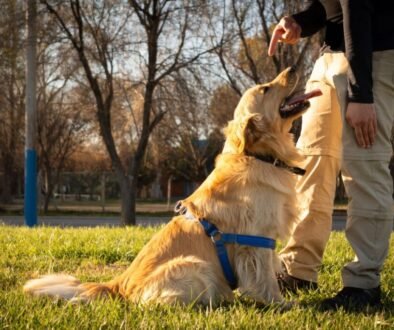Are Golden Retrievers Easy to Train? Unveiling the Truth Behind Their Reputation
Golden Retrievers have earned a glowing reputation for being one of the most lovable and family-friendly dog breeds. But when it comes to training, are they as cooperative as their cheerful faces suggest? Whether you’re a first-time dog owner or a seasoned pet parent, you’ve likely wondered: Are Golden Retrievers really easy to train, or is it just a myth?
Let’s dive into the heart of the matter to uncover why Golden Retrievers are widely celebrated for their trainability, what makes them unique, and how you can ensure a smooth training journey. Along the way, we’ll share fascinating insights, practical tips, and a little humor to keep things light and fun. By the end of this article, you’ll have all the tools you need to decide if a Golden Retriever is the perfect fit for your lifestyle.
Introduction to Golden Retrievers
Picture this: a golden-coated dog with a tail wagging so hard it could power a small windmill. That’s the Golden Retriever for you—a breed that seems to embody happiness itself. But their popularity isn’t just about their sunny disposition. According to the American Kennel Club (AKC), Golden Retrievers are consistently ranked among the top three most popular breeds in the U.S., thanks to their intelligence, loyalty, and affectionate nature.
However, the real question for prospective owners is whether these qualities translate into ease of training. Spoiler alert: the answer is yes—most of the time. But like any dog breed, they have quirks and challenges that require understanding and effort. Ready to find out more? Let’s jump into the details!
What Makes Golden Retrievers So Trainable?

Their Intelligence
Golden Retrievers rank as the fourth smartest working dog breed, according to canine psychologist Dr. Stanley Coren’s research on dog intelligence. This means they can learn new commands in as few as five repetitions and often obey the first command 95% of the time. Whether you’re teaching basic commands like “sit” and “stay” or more advanced tricks like fetching slippers (yes, really), their intelligence makes the process faster and more enjoyable.
Their problem-solving skills also shine when they’re engaged in activities like agility training or puzzle games. But beware: their smarts can work against you if they sense inconsistency in training. In other words, they might just outsmart you if you’re not on your game!
Their Eager-to-Please Attitude
Golden Retrievers are often described as “people pleasers.” Unlike some independent breeds that prefer to do things their way (we’re looking at you, Siberian Huskies), Goldens thrives on positive reinforcement and human approval. If they know they’ve made you happy—whether through a treat, a belly rub, or a simple “good boy!”—they’ll do their best to repeat the behavior.
This eagerness is rooted in their history as working dogs bred to retrieve games for hunters. A cooperative attitude was essential for their job, and it’s still hardwired into their DNA today.
“Golden Retrievers are like enthusiastic team players, always eager to follow instructions and make you proud.!”
Training Basics: Setting Yourself and Your Dog Up for Success

Training your Golden Retriever doesn’t require you to be a professional dog trainer, but it does demand some preparation and a clear plan. Here’s how to get started.
Positive Reinforcement Techniques
Golden Retrievers respond exceptionally well to positive reinforcement, which involves rewarding desirable behaviors instead of punishing mistakes. Examples include:
- Treats: Use small, tasty treats during training sessions to keep them motivated.
- Praise: Never underestimate the power of a heartfelt “Good girl!”
- Play: Incorporate their favorite toys or games as rewards.
Avoid harsh corrections or yelling, as Golden Retrievers are sensitive and may shut down emotionally if they sense your frustration.
Consistency and Patience
- Stick to a Routine: Dogs thrive on routine. Keep training sessions at the same time each day to build a habit.
- Short Sessions: Keep lessons between 5–15 minutes to avoid boredom.
- Clear Commands: Use simple, consistent commands (e.g., always say “down” instead of alternating between “down” and “lay down”).
Patience is critical—especially with puppies. Remember, every dog learns at its own pace, and some behaviors may take weeks to solidify.
Common Training Challenges (And How to Overcome Them)
Even the most trainable dogs have their hiccups. Here are some challenges you might face and how to tackle them.
1. Chewing

-
- Why it Happens: Puppies explore the world with their mouths, and Goldens are no exception.
- Solution: Provide plenty of chew toys and redirect them when they go for shoes or furniture.
2. Pulling on the Leash

-
- Why it Happens: Their enthusiasm gets the better of them during walks.
- Solution: Use a front-clip harness and practice loose-leash walking techniques. Reward them for walking beside you instead of pulling ahead.
Training Tip: Incorporate verbal cues like “heel” to teach your dog to walk calmly by your side. Start in a low-distraction environment and hold a treat near your hip to guide them into position. Say “heel” in a clear, upbeat tone and reward them when they stay beside you. Gradually increase distractions as your dog improves. If they start pulling, stop walking immediately and wait until they return to your side before resuming. Consistency is key to reinforcing this behavior.
3. Jumping on People

-
- Why it Happens: They’re just so excited to see you!
- Solution: Train them to sit when greeting people. Ignore them until all four paws are on the ground, then reward calm behavior.
Tips for Advanced Training

Once you’ve mastered the basics, you can take your training to the next level with these advanced tips:
- Agility Training: Golden Retrievers excel at agility courses, which challenge their intelligence and athleticism.
- Therapy Work: With their friendly demeanor, Goldens make excellent therapy dogs. Training for therapy certification can be a rewarding experience for both you and your dog.
- Fun Tricks: Teach your Golden to fetch specific items, roll over, or even “play dead.”
- Scent Work: Goldens have a keen sense of smell, making them excellent candidates for scent work. You can train them to locate specific items, such as hidden treats, or even participate in formal scent detection sports. This not only engages their minds but also provides a fun challenge.
- Competitive Obedience: Golden Retrievers thrive in structured environments and can excel in competitive obedience trials. These events test advanced skills like precision heeling, long stays, and retrieving specific items on command. Their eagerness to perform and bond with their owners makes them stand out in these competitions.
Adding these advanced activities to your training regimen is a fantastic way to keep your Golden physically and mentally stimulated while strengthening your bond.
Fun Fact: Did you know Golden Retrievers have dazzled on the big screen? One of the most famous examples is Air Bud, a movie about a Golden Retriever with an incredible talent for basketball. Buddy, the canine star of the film, showcased just how intelligent and trainable Golden Retrievers are, effortlessly mastering tricks and following complex commands to bring his character to life. The movie not only highlighted the breed’s smarts but also their charm and versatility, cementing their place as beloved family dogs both on and off the screen.
Conclusion: Are Golden Retrievers Right for You?

So, are Golden Retrievers easy to train? The answer is a resounding yes—if you’re willing to put in the time and effort. Their intelligence, eagerness to please, and friendly nature make them one of the most trainable breeds, but they still require patience, consistency, and plenty of positive reinforcement.
If you’re looking for a loyal, trainable companion who can excel in everything from basic obedience to advanced tricks, a Golden Retriever might just be your perfect match.
FAQs About Golden Retriever Training
Q: At what age should I start training my Golden Retriever?
A: Start as early as eight weeks old. Puppies are like little sponges and can begin learning basic commands right away.
Q: How long does it take to train a Golden Retriever?
A: It depends on the dog and the training goals. Basic commands can take a few weeks, while advanced training may take months.
Q: Can older Golden Retrievers be trained?
A: Absolutely! While puppies learn faster, adult Goldens are just as eager to please and can pick up new skills with consistent training.
Q: Do Golden Retrievers need professional training?
A: Not necessarily, but professional classes can help if you’re struggling or want to tackle advanced skills.
Q: How much exercise does a Golden Retriever need during training?
A: Golden Retrievers need at least 1–2 hours of physical activity daily, which can include walks, playtime, and training sessions.
Q: Are Golden Retrievers suitable for first-time dog owners?
A: Yes, their trainable nature and friendly temperament make them an excellent choice for first-time dog owners. However, they require consistent training, exercise, and attention.
Q: Do Golden Retrievers get bored easily during training?
A: Yes, they can get bored if training sessions are too long or repetitive. Keep sessions engaging by mixing in games, toys, and varying commands.
Golden Retrievers are more than just pretty faces—they’re intelligent, eager-to-please dogs who can make training a joy for owners. With the tips and insights shared here, you’ll be well on your way to raising a happy, well-behaved Golden Retriever. So, what are you waiting for? Your golden adventure awaits!



